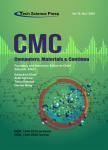Classification of Fundus Images Based on Deep Learning for Detecting Eye Diseases
作者机构:Department of ICT Convergence Rehabilitation EngineeringSoonchunhyang UniversityAsan31538Korea Department of Computer Science and EngineeringSoonchunhyang UniversityAsan31538Korea
出 版 物:《Computers, Materials & Continua》 (计算机、材料和连续体(英文))
年 卷 期:2021年第67卷第4期
页 面:411-426页
核心收录:
学科分类:08[工学] 0812[工学-计算机科学与技术(可授工学、理学学位)]
基 金:supported by the KIAT(Korea Institute for Advancement of Technology)grant funded by the Korea Government(MOTIE:Ministry of Trade Industry and Energy)(No.P0012724) the Soonchunhyang University Research Fund
主 题:Multi-categorical classification deep neural networks glaucoma age-related macular degeneration diabetic retinopathy
摘 要:Various techniques to diagnose eye diseases such as diabetic retinopathy(DR),glaucoma(GLC),and age-related macular degeneration(AMD),are possible through deep learning algorithms.A few recent studies have examined a couple of major diseases and compared them with data from healthy ***,multiple major eye diseases,such as DR,GLC,and AMD,could not be detected simultaneously by computer-aided systems to *** were just high-performance-outcome researches on a pair of healthy and eye-diseased group,besides of four categories of fundus image *** have a better knowledge of multi-categorical classification of fundus photographs,we used optimal residual deep neural networks and effective image preprocessing techniques,such as shrinking the region of interest,iso-luminance plane contrast-limited adaptive histogram equalization,and data *** these to the classification of three eye diseases from currently available public datasets,we achieved peak and average accuracies of 91.16%and 85.79%,*** specificities for images from the eyes of healthy,GLC,AMD,and DR patients were 90.06%,99.63%,99.82%,and 91.90%,*** better specificity performances may alert patient in an early stage of eye diseases to prevent vision *** study presents a possible occurrence of a multi-categorical deep neural network technique that can be deemed as a successful pilot study of classification for the three most-common eye diseases and can be used for future assistive devices in computer-aided clinical applications.



